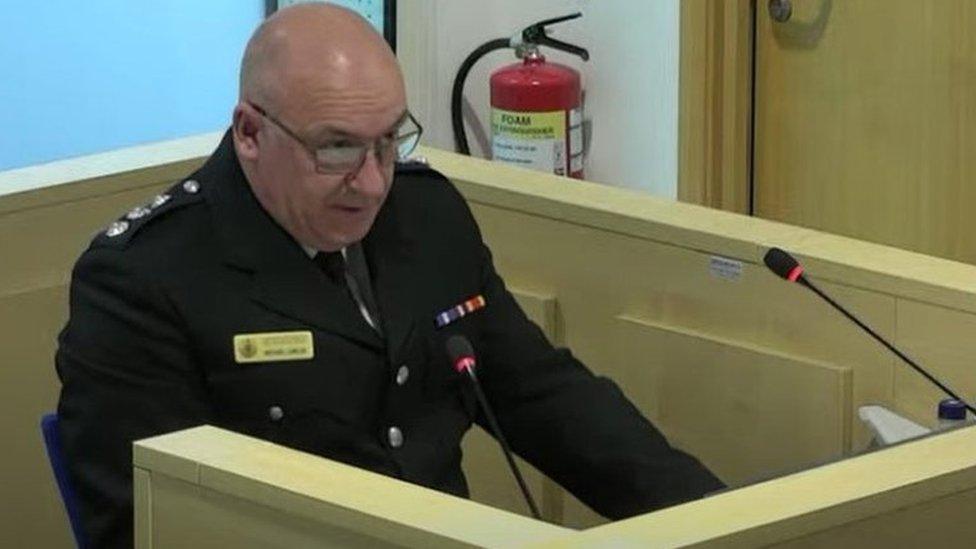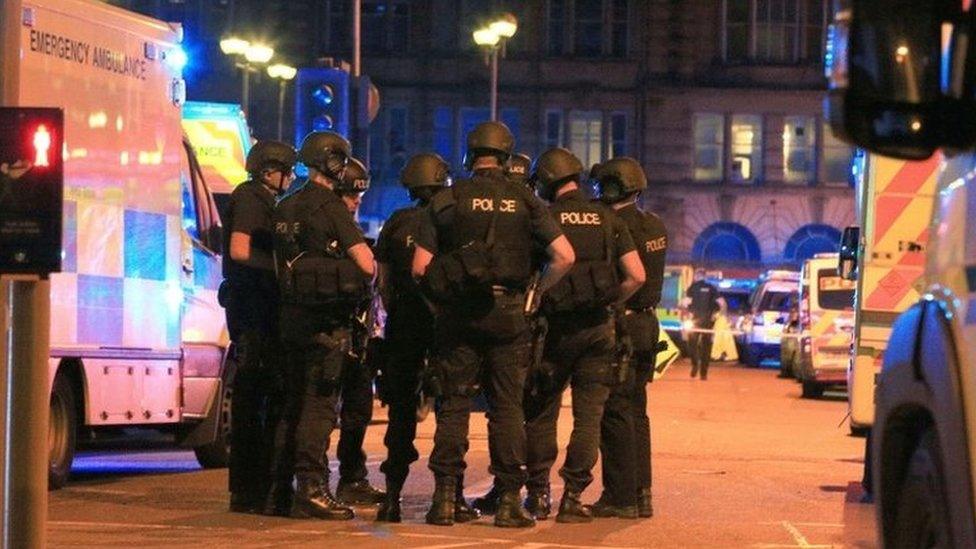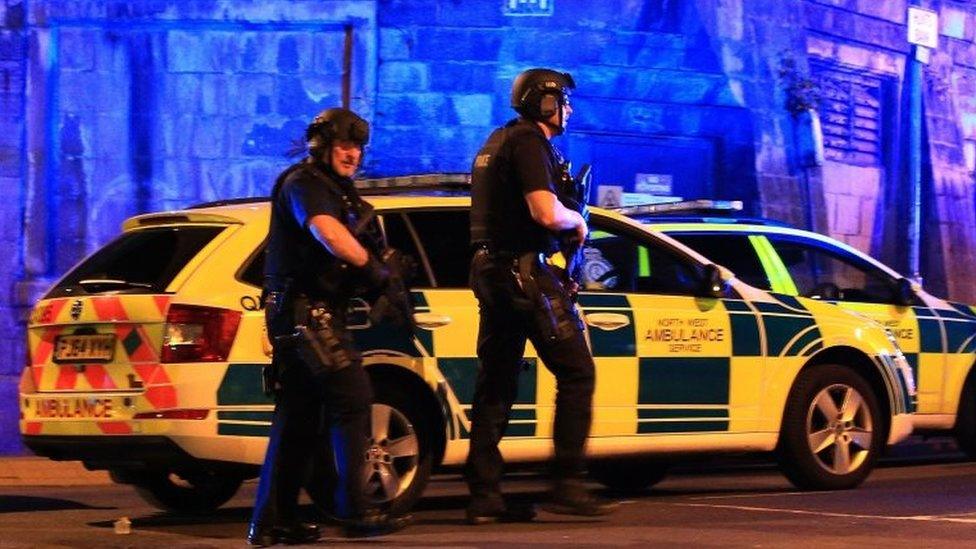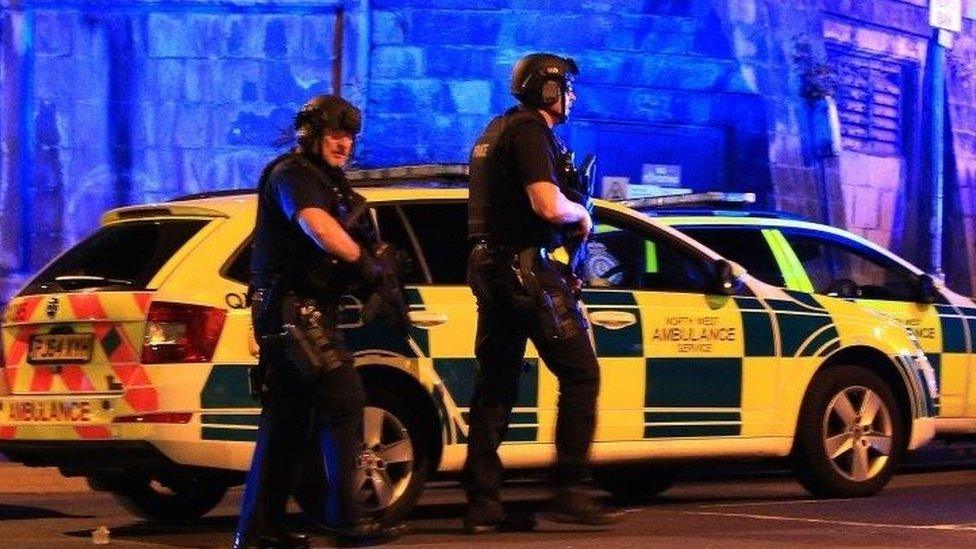Manchester Arena Inquiry: Delays denied victims 'vital assistance'
- Published

Michael Lawlor said specialist fire crews could have helped treat the wounded but never entered the foyer
The victims of the Manchester Arena bombing were denied "vital assistance" because of confusion over the nature of the attack, an inquiry has heard.
The Manchester Arena Inquiry was told specialist fire responders were not mobilised because police did not share details of what had happened.
Only one paramedic entered the scene in the first 40 minutes after the bomb.
A senior fire officer agreed that had crews entered earlier, they could have helped the injured and dying.
Twenty-two people died and hundreds more were injured when a bomb was detonated in the foyer of Manchester Arena following a concert on 22 May 2017.
Michael Lawlor, a senior national inter-agency liaison officer with Greater Manchester Fire and Rescue Service (GMFRS), said if firefighters had been allowed into the scene of the bombing sooner, they would have been able to bandage serious blast wounds and help paramedics take the injured to waiting ambulances.
The inquiry heard police declared a marauding terrorist firearms attack 16 minutes after the blast, due to reports of gunfire which were later proved wrong, but did not inform the fire and ambulance services.
Mr Lawlor said there were two specialist vehicles carrying 12 responders available in the event of a marauding terrorist attack.
He said the crews could have taken 10 stretchers to the foyer to assist moving casualties to a holding point before transportation to hospital and they also had equipment to treat the wounded, adding: "We have specific packs to pack those wounds out and where possible, stem the bleeding."

Twenty-two people were killed and hundreds more injured in the 2017 bombing
The aftermath of the attack saw casualties carried out on makeshift stretchers with only one actual stretcher used.
John Cooper QC, representing a number of the bereaved families, asked Mr Lawlor if he accepted that "there were not only lengthy delays as far as the deployment of fire personnel are concerned, but, in relation to specialist equipment, it never even arrived at the arena?"
Mr Lawlor replied that that was correct and "absolutely" agreed when Mr Cooper said such a situation was "very serious".
He also agreed that his colleagues' training, equipment and resources had been "taken out of the equation".
Mr Cooper continued that he was "in no way impugning brave individual men and women" who had helped after the bombing, "but the fact of the matter is for some reason... vital assistance to casualties, vital assistance to the dying was denied of them, wasn't it?"
Mr Lawlor again replied that that was correct.
'Significant failure'
The inquiry also heard more about Winchester Accord, a counter-terrorism training exercise held a year before the bombing, which involved a mock terrorist on the loose at the Trafford Centre.
John Fletcher, former contingency planning manager at GMFRS, told the inquiry the exercise was a "significant failure of emergency co-operation".
He said in a similar way to what happened on the night of the arena attack, a lack of information from Greater Manchester Police meant fire and ambulance crews were delayed in deploying by 90 minutes during that exercise.
He said he asked his police counterpart about considering preparing a one-day awareness course for commanders from emergency services "to discuss individual agency capabilities", adding in a statement at the time that he understood it was "a big ask, but [I] think it would go a long way in stopping repetition of the same learning outcomes from multiple exercises".
The inquiry continues.

Why not follow BBC North West on Facebook, external, Twitter, external and Instagram, external? You can also send story ideas to northwest.newsonline@bbc.co.uk, external
- Published9 February 2021

- Published8 February 2021

- Published3 February 2021

- Published2 February 2021

- Published1 February 2021

- Published1 February 2021

- Published26 January 2021

- Published3 November 2022
